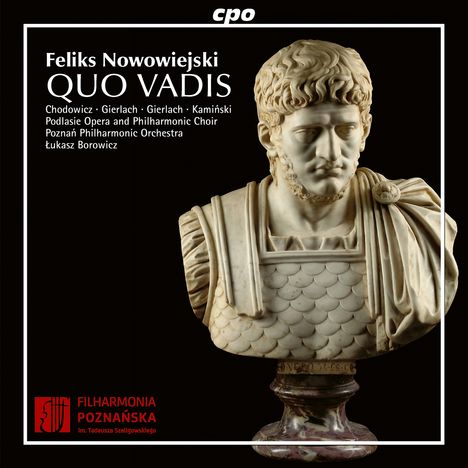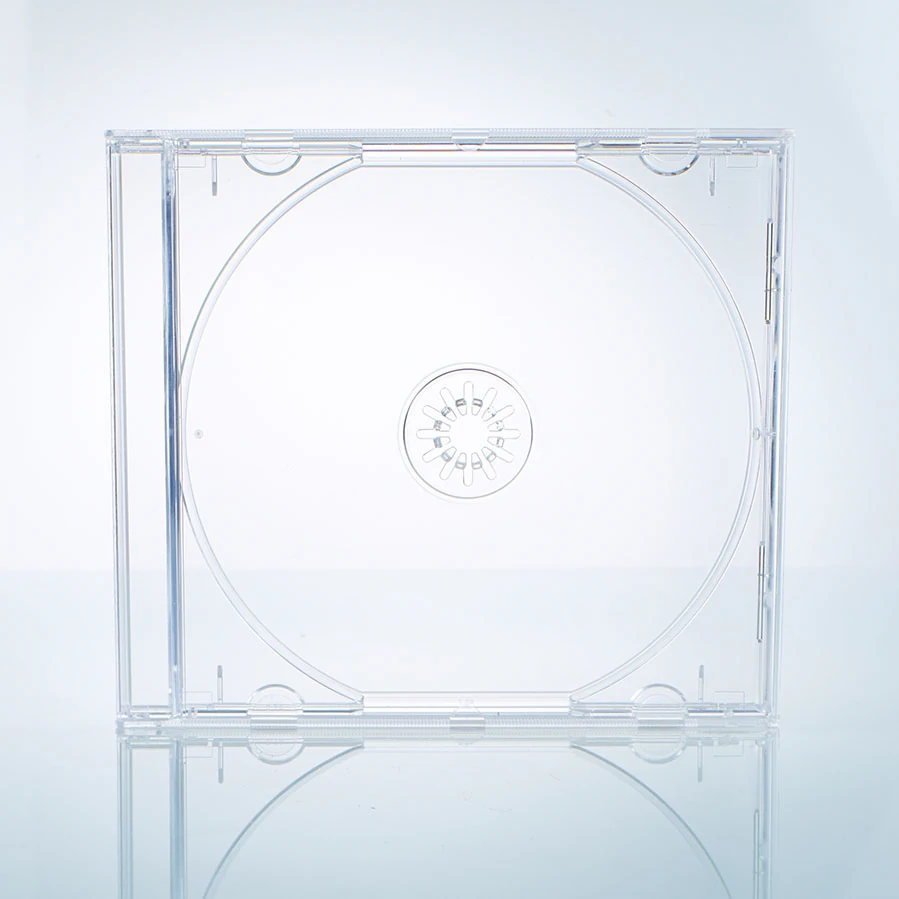Felix Nowowiejski: Quo Vadis (Oratorium für Soli, Chor, Orgel & Orchester) auf 2 CDs
Quo Vadis (Oratorium für Soli, Chor, Orgel & Orchester)
Herkömmliche CD, die mit allen CD-Playern und Computerlaufwerken, aber auch mit den meisten SACD- oder Multiplayern abspielbar ist.
Lassen Sie sich über unseren eCourier benachrichtigen, falls das Produkt bestellt werden kann.
- Künstler:
- Wioletta Chodowicz, Wojtek Gierlach, Robert Gierlach, Podlasie Opera and Philharmonic Choir, Poznan Philharmonic Orchestra, Lukasz Borowicz
- Label:
- CPO
- Aufnahmejahr ca.:
- 2016
- UPC/EAN:
- 0761203508921
- Erscheinungstermin:
- 29.5.2017
Ähnliche Artikel
So klingt es, wenn Rom brennt
Vor 100 Jahren war es in ganz Europa der absolute Renner - das Oratorium "Quo Vadis" in der großen Besetzung für Soli, gemischten Chor, Orgel und Orchester nach Henryk Sienkiewiczs gleichnamigen Roman von Feliks Nowowiejski. Jetzt können wir das gigantische Werk in der Interpretation der Philharmonie Poznań unter Leitung von Łukasz Borowicz mit hervorragenden Solisten und dem Chor der Podlachischen Oper und Philharmonie Białystok auf cpo veröffentlichen. Nowowiejski komponierte sein Oratorium 1903. In den darauf folgenden dreißig Jahren wurde es mehr als 200 Mal in ganz Europa und in beiden Amerikas aufgeführt. Nicht zuletzt weil die literarische Vorlage, Henryk Sienkiewiczs Roman gleichen Titels, sehr bekannt war. Für sein literarisches Schaffen war der polnische Schriftsteller Sienkiewicz 1905 mit dem Literaturnobelpreis ausgezeichnet worden - die Popularität seines Romans "Quo Vadis" dürfte daran einen beträchtlichen Anteil gehabt haben. Viele der Werke Nowowiejskis sind Ausdruck einer Identitätssuche, vor allem auch das Oratorium "Quo Vadis". Doch es verkörpert ebenso allgemein humanistische Werte - wie das literarische Werk Sienkiewiczs - und taugt nicht zur politischen Vereinnahmung, weder damals noch heute.
Product Information
An Oratorio for »When Rome Burns …«
A hundred years ago it was absolutely the greatest hit everywhere in Europe – the oratorio Quo Vadis by Feliks Nowowiejski, based on Henryk Sienkiewicz’s novel of the same name and magnificently scored for soloists, mixed chorus, organ, and orchestra. We at cpo are now releasing this gigantic work in an interpretation by the Poznań Philharmonic under the conductor Łukasz Borowicz and with outstanding soloists and the Chorus of the Podlasie Opera and Philharmonic of Białystok. Nowowiejski composed his oratorio in 1903, and during the following thirty years it was performed more than two hundred times throughout Europe and in North and South America – not least because its literary source, Henryk Sienkiewicz’s novel with this title, was very well known. The Polish writer Sienkiewicz was awarded the Nobel Prize for Literature in 1905, and the popularity of his novel Quo Vadis must have substantially contributed to this decision. Many of Nowowiejski’s works are the expression of a quest for identity, and here the oratorio Quo Vadis leads the search. After all, it embodies generally humanistic values – like Sienkiewicz’s literary oeuvre – and was and is situated beyond the realm of partisan politics.
Rezensionen
klassik-heute.de 06/2017: »In Polen wird er sehr verehrt, in Deutschland ist er nahezu unbekannt. Zeit also, ihn kennenzulernen. Dafür bietet diese Doppel-CD eine hervorragende Gelegenheit. Lukasz Borowicz hat sich mit liebevollem und leidenschaftlichem Engagement, ja mit Herzblut, diesem Oratorium gewidmet, seine Mitstreiter antworteten ihm mit ebenso viel musikalischer Leidenschaft. Wirkungsvoll knallig ist die Musik zu Beginn, klingt manchmal wie ›Elias‹ von Mendelssohn Bartholdy, manchmal wie Filmmusik, Nowowiejski weiß Chor- und Klangmassen geschickt zu ballen. Es wird Zeit, Feliks Nowowiejski wieder zu entdecken! Diese Doppel-CD bietet dafür eine glänzende Gelegenheit.«the-new-listener.de 07/2017: Das Verdienst des Labels cpo in Bezug auf polnische Musik ist nicht nur die (Wieder)-Entdeckung der Musik für Sir Andrzej Panufnik unter Lukasz Borowicz in vorzüglichen Aufnahmen, sondern hier nun auch, die Bekanntschaft zu ermöglichen mit einem der größten Erfolge der Musikgeschickte, einem Werk von mitreißend heroischem Charakter und episch fesselnder Dimension. Zum 70. Todestag des Nowowiejskis kommt also die Möglichkeit, eines der großartigsten Werke der Romantik neu zu erleben, wie gerufen. Ein vergessenes Meisterwerk.»
Disk 1 von 2 (CD)
Quo vadis (Oratorium für Gesang, Chor, Orgel und Orchester)
-
1 Introduktion
-
2 The gods' dread ire (Jowiszów grom)
-
3 Six days have seen no blush of morn (Szesc dni nie wschodzi slonce nam)
-
4 We saw the monarch (Na szczycie gmachu)
-
5 Tell! Who hath enkindled the wrath (Kto?... Kto to rozpetal)
-
6 March of the Pretorians (Marsz pretorianów)
-
7 Hail, all hail, to you, worthy Romans (Pozdrowienie sle boski Neron)
-
8 Christianos ad leones!
-
9 Come, brothers, come, and sing to the Lord! (O bracia, niechaj bedzie pochwalony Pan)
-
10 The tyrants threat (Tyrani groza)
-
11 We are prepared, in Jesu name (Mysmy gotowi w imieniu Pana)
-
12 I, the shepherd, you, my flock here (Az po dzien ostatni zycia)
-
13 Thou, Lord, a victim of Rome's tyrant (O Panie, nasz swiety przewodniku)
-
14 Me thinks that God thro' you hath spoken! (Czyz Pan przez wasze mówi usta?)
-
15 The Lord be with thee (Niech Pan strzeze Cie)
Disk 2 von 2 (CD)
-
1 Andante sostenuto
-
2 Deep, deep dark night (Jak ciemna noc)
-
3 Quo vadis, Domine?
-
4 O Lord, help me (O Panie, oto w prochu leze ja)
-
5 I'll go to Rome (A wiec do Rzymu!)
-
6 Glory, glory and praise be thine! (Czesc Ci, Czesc Ci, potezny czesc!)
-
7 Doppelfuge: Gloria tibi sancte Petrus
-
8 Gloria Patri et Filio et Spritui Sancto
-
9 Amen















